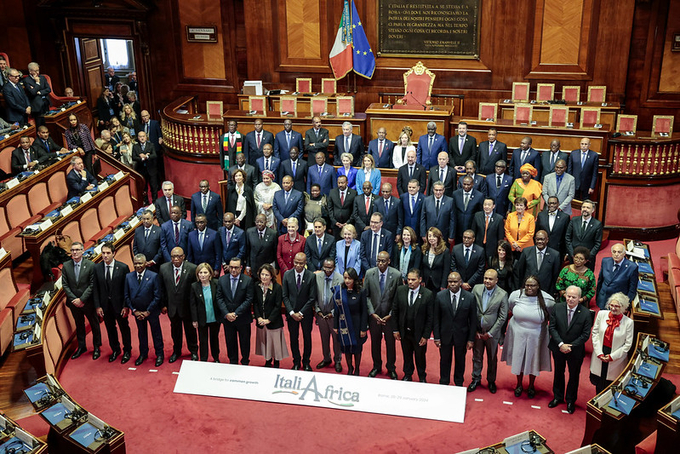May 21, 2025 | 03:00 GMT +7
May 21, 2025 | 03:00 GMT +7
Hotline: 0913.378.918
May 21, 2025 | 03:00 GMT +7
Hotline: 0913.378.918

FAO Director-General QU Dongyu takes part in the family photo of the summit: “Italy-Africa: A bridge of common growth" at the Italian Senate.
Transformation to more efficient, inclusive, resilient and sustainable agrifood systems in Africa can boost average agricultural productivity by two to three times and stimulate rural renovation and development, the Director-General of the Food and Agriculture Organization of the United Nations (FAO) QU Dongyu said today.
He spoke at the Italy-Africa Summit: A Bridge for Common Growth, taking place on 28-29 January, at the Italian Senate in Rome. The event brought together Africa’s heads of state and government; top Italian officials including President of the Council of Ministers, Giorgia Meloni; Chairperson of the African Union, Azali Assoumani; Chairperson of the African Union Commission, Moussa Faki; President of the European Parliament, Roberta Metsola; President of the European Council, Charles Michel; President of the European Commission, Ursula von der Leyen; Deputy Secretary-General of the United Nations, Amina Mohammed and others.
In his address, the Director-General emphasized that agrifood systems are the backbone of Africa providing 62 percent of livelihoods. While praising Africa’s numerous assets such as abundant natural resources, a promising young population, traditions, and knowledge, the Director-General noted that some 20 percent of the continent’s population was still undernourished.
“With over 350 million hectares of cultivated cropland - double that of the European Union - Africa has the potential to produce enough food to feed itself and contribute to global food security,” Qu said.
To unleash Africa’s full potential, the Director-General outlined five key pillars that can provide game-changing solutions to efficient agrifood systems transformation, underpinned by strategic partnerships: 1) targeted investment; 2) creating jobs for youth and women empowerment; 3) collectively addressing the root causes of migration, bringing new hope and new solutions; 4) innovation and skills development, particularly for youth and women; and 5) improving market access and trade.
To this end, the Director-General stressed that sustainably harnessing the potential of Africa’s massive domestic food market could help achieve the vision of an African Continental Free Trade Area, leading to a possible 20 to 30 percent increase in inter- and intra-regional trade in agricultural products by 2040.
This would also strengthen resilience to shocks and stresses, create jobs and market opportunities and help tackle the impacts of the climate crisis, Qu added.
In his remarks, the Director-General commended the Government of Italy for convening the summit to promote an equal partnership with Africa and ensuring that the region remains central to discussions during the Italian Presidency of the G7.
Qu also thanked Italy for generous voluntary contributions, with Africa as one of the main partners, as well as for the new collaboration on the joint project “Green Cities for Africa”, within the context of the FAO Green Cities Initiative. The project aims to support the actions for mitigation and adaption in ten African cities.
(FAO)

(VAN) Attempts to bring down the price of the Japanese staple have had little effect amid a cost-of-living crisis.

(VAN) Fourth most important food crop in peril as Latin America and Caribbean suffer from slow-onset climate disaster.

(VAN) Shifting market dynamics and the noise around new legislation has propelled Trouw Nutrition’s research around early life nutrition in poultry. Today, it continues to be a key area of research.

(VAN) India is concerned about its food security and the livelihoods of its farmers if more US food imports are allowed.

(VAN) FAO's Director-General emphasises the need to work together to transform agrifood systems.

(VAN) Europe is facing its worst outbreak of foot-and-mouth since the start of the century.

(VAN) The central authorities, in early April, released a 10-year plan for rural vitalization.